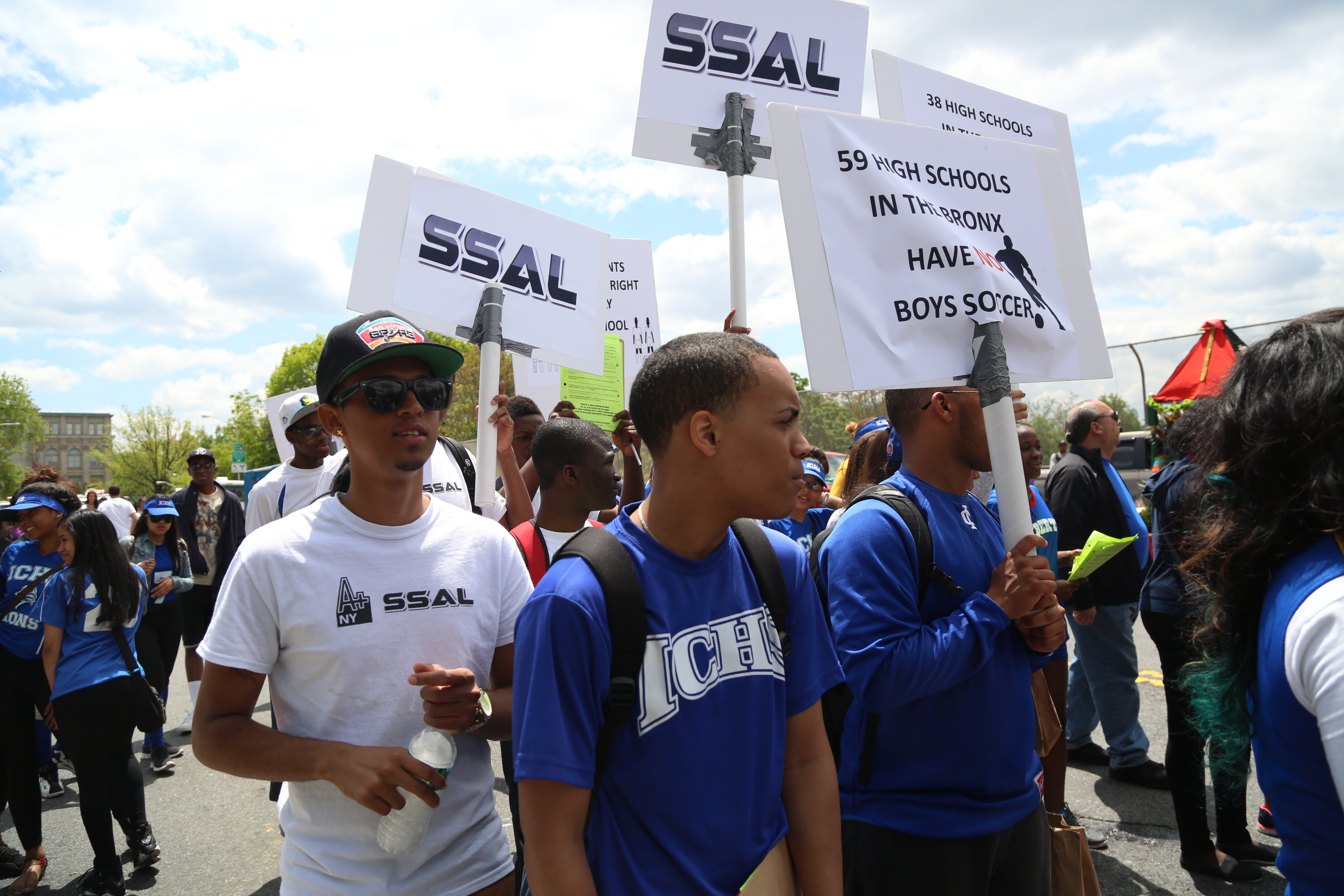
City’s policy is discriminatory, advocates argue
Since he was a child, Carlos Lopez has been playing basketball and baseball.
Although he says he would have loved to play sports at his Mott Haven high school, it wasn’t until last year that he had that option. “There was no team before the Small Schools Athletic League,” Lopez said.
Lopez is a senior at The International Community High School on Morris Ave., one of 42 city schools where students won’t be able to play organized sports any time soon because the City says it is cutting off funding to its programs.
David Garcia-Rosen, a former dean and teacher at International, founded the Small Schools Athletic League in 2011 to address what he says are inequalities in the way the city’s education department funds school sports.
He says he wants his students to benefit from the same kinds of athletic programs the City’s education department routinely funds in wealthier schools.
“As your percentage of white students shoots up or your percentage of students of color goes down, your access to huge sports programs increases dramatically,” he said, adding that the education department “has created a system of such inequity” that only fundamental reform will change it.
Student protesters tossed from budget hearing
By Ben Shanahan
A group of about two-dozen student-athletes and teachers was kicked out of City Hall on May 28th for protesting the City’s decision not to fund the Small Schools Athletic League.
The protesters were promptly shown the door after walking in on a City Council education committee budget hearing to demand continued funding for their programs.
The group wore inside-out athletic jerseys while making a boisterous entrance into the chambers, taking a page from the NBA’s Los Angeles Clippers, who flipped their jerseys for a practice earlier this month in response to recent racist remarks made by the team’s owner Donald Sterling.
The founder and director of the student league, David Garcia-Rosen, told the Council that the young people are fighting “a tale of two high school sports cities.”
Addressing the press outside the chamber doors, Garcia-Rosen denounced the education dept. for offering him a job with its Public School Athletic League as a way of trying to appease him.
“The PSAL is the problem, the SSAL is the solution,” Garcia-Rosen said. “Fund the solution, investigate the problem.”
“Sports is every bit as important as the academics for these kids,” said Matthew McKenna, athletic director of Mott Haven’s Community School for Social Justice.
“They need something to stay motivated and stay in school.” Jovania Estrella, a student at the Community School, came to urge the City to continue funding the flag football league he plays in.
“Right now, we have principals taking their own time—taking money out of their own pockets—to coach us,” Estrella said.
The Small Schools league has been asking the City for $1.25 million dollars in 2015 to keep its present teams afloat.
After negotiations with the education department failed, Garcia-Rosen said, he plans to file a federal lawsuit against the City for discriminatory practices.
To field a team, schools are now required to apply through the education department’s Public School Athletic League. That process lacks transparency and favors big schools in wealthy areas, Garcia-Rosen argues.
The City’s preferences are stark, he said. Data from the 2012-2013 school year shows city schools with the most sports teams also have the highest percentage of white students.
This fiscal year, “the 50 high schools with the least students of color got 84” new teams, he wrote in an email. By contrast, “not one team was granted to the high schools that are 100% students of color,” he wrote.
But while the City has declined to fund the league, it “went ahead and gave out table tennis and badminton to all the same schools again,” as in previous years, he said.
A spokesman for the education department, however, denied such inequities exist.
“The PSAL constantly expands opportunities to meet the needs of our diverse student population and looks to add new sports offerings each season,” a spokesman for the DOE wrote in an email to The Herald.
Baloney, said Garcia-Rosen, pointing out that the City has funded 42 teams for Tottenville High School in Staten Island, compared with zero at International Community High School.
The Small Schools league maintains that the City should freeze allocations to schools it already funds, in order to even the playing field. In addition, Garcia-Rosen and his supporters say the education dept. should create a task force to probe imbalances between sports programs in schools in poor and wealthy neighborhoods.
Elias Sideras, who oversees the girl’s baseball, softball and volleyball at Bronx Bridges High School in Soundview, says the loss of sports will harm student performance. The athletic program has led to dramatic improvements in grades, he said, adding that it offers “a different experience to students who have the commitment and the interest.”
Losing sports at Bridges could potentially kill students’ incentive, he said, adding that teachers have to grant approval for students to play on the school’s teams, which provides a major source of motivation for many to excel in the classroom, he said.
“We’re going to go back into the same situation of trying to find that hook to keep our students focused in school,” he said. Jasmin Arias, 17, plays on the Volleyball team at Bronx Bridges.
“It has been a great experience to actually get to play a sport and be able to join a league,” Arias said. “I am more motivated to be in school and do well.”


[…] Hope wrote about school sports budget cuts for the Mott Haven Herald. Jennifer Lehman chronicled a setback for tenants at a […]